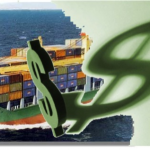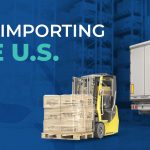Top 10 Imports For Indonesia to U.S. Shipping
Indonesia has the fourth-largest labor force in the world, allowing the country to manufacture a wide variety of goods and products for distribution globally. Top exports of Indonesia range from clothing and furniture to mineral fuels and rubber. Indonesia has a thriving agricultural industry that exports fish, vegetable oils, coffee and tea, cocoa and other edible goods around the world. Surrounded by water in Southeast Asia, the Indonesian archipelago is also perfectly positioned for international shipping and boasts more than 150 ports.
Trading with Indonesia provides the opportunity to grow your business by tapping into a new market of exotic goods and regional products. Companies that import from Indonesia can enjoy high profit margins on well-made products. Exporters can also expand their customer base by shipping goods overseas. If you are considering importing goods from Indonesia or exporting your products to Indonesia, this piece will cover the essentials of U.S.-to-Indonesia shipping.
What Are the Most Common Items Imported From Indonesia to the United States?
Indonesia was the 22nd-largest import partner to the U.S. in 2018 and supplied $20.9 billion in imported goods. Imports from Indonesia increased by 3.3% from 2017 and 32.1% over the last 10 years. During the first quarter (Q1) of 2019, imports from Indonesia totaled $5 billion. The U.S. exported $8.2 billion in goods to Indonesia in 2018 and $1.9 billion in Q1 2019.
Importing to the U.S. from Indonesia accounts for less than 1% of global imports to the U.S. However, the U.S. is one of Indonesia’s top export partners. Goods and services exports to the U.S. accounted for 10.8% of Indonesia’s total exports in 2017, second only to China, which held 13.8% of total exports from Indonesia.
Indonesian exports of clothing and footwear dominate trade with the U.S., accounting for a combined 29.1% of all U.S. imports from Indonesia in 2018.1 Indonesia has a thriving apparel and textile industry, and more than 60% of clothing manufactured in Indonesia gets shipped to other countries around the world. Because of Indonesia’s large workforce and low labor costs, the nation can produce apparel at an affordable price.
Businesses importing footwear and apparel to the U.S. from Indonesia can enjoy large profit margins while offering high-quality products to their customers. Clothing manufacturers in Indonesia adhere to international standards for quality and production efficiency. Many popular and well-known fashion brands have manufacturing facilities in Indonesia, including Calvin Klein, Tommy Hilfiger, Uniqlo and H&M.
Another major U.S. import from the tropical nation of Indonesia is seafood. With the Indonesian islands stretching more than 735,358 square miles, it is the largest archipelago in the world and boasts a rich fishing industry. Fish and crustaceans account for about 5.9% of all U.S. imports from Indonesia, and prepared fish and meats account for an additional 3.4%.1 Indonesian fisheries have access to the Indian and Pacific Oceans, as well as numerous seas, where they can catch an abundance of seafood, including shrimp, tuna, tilapia, crab and octopus.
Other top exports of Indonesia to the U.S. include rubber, crude oil, electric machinery, tropical oils and furniture. The primary exports of U.S. goods to Indonesia include oilseeds, industrial machinery, cotton, animal feed and wood pulp.
Top 10 Imports From Indonesia to the U.S.
Below are the top 10 exports of Indonesia to the U.S., based on the latest trade data from the International Trade Administration. All products include their two-digit or four-digit HS Code.
1. Knit and Crochet Apparel and Accessories
Knit and crochet clothing and accessories (HS Code 61) are the top import from Indonesia to the United States. In 2018, Indonesian imports of knit apparel totaled $2.3 billion and accounted for 11.1% of all U.S. imports from Indonesia. Imports of knit clothing had a $572.3 million value for Q1 2019. Sweaters, vests and pullovers (HS Code 6110) were the most popular import to the U.S. at 38.6%, and women’s or girls’ suits and ensembles (HS Code 6104) followed at 24.0%.2
2. Woven Apparel and Accessories
Apparel and accessories that are not knitted or crocheted (HS Code 62) accounted for 10.6% of all U.S. imports from Indonesia in 2018 and totaled $2.2 billion. The most popular woven clothing products from Indonesia were women’s or girls’ suits and ensembles (HS Code 6204), at 23.4%, and women’s or girls’ shirts and blouses (HS Code 6206) at 17.3% of all woven apparel imports. Men’s and boys’ suits and ensembles (HS Code 6203) followed at 16.0%, and men’s and boys’ shirts (HS Code 6205) accounted for 12.9%.3
Woven apparel from Indonesia is often desirable for the traditional Indonesian batik style. Batik, originating in Java, is a technique that involves using wax to block out patterns on cloth and then dyeing the cloth. After completing the dyeing, artisans remove the wax to reveal the design. By applying multiple layers of wax, creators can produce intricate and colorful patterns.
3. Rubber
Rubber (HS Code 40) is Indonesia’s fourth-largest export globally, accounting for 4.6% of Indonesian goods exports worldwide. U.S. imports of rubber from Indonesia had a $1.8 billion value in 2018 and were the third-largest imported good at 8.6%.1 Rubber imports for Q1 2019 totaled $432.1 million.
The primary rubber good imported from Indonesia to the U.S. was natural rubber (HS Code 4001), which accounted for 52.2% of all rubber imports. Natural rubber also includes balata, gutta-percha, guayule, chicle and other natural gums, and can be exported in its primary form or in sheets, strips or plates. The second-largest rubber export from Indonesia to the U.S. was pneumatic tires (HS Code 4011) at 38.0%.4
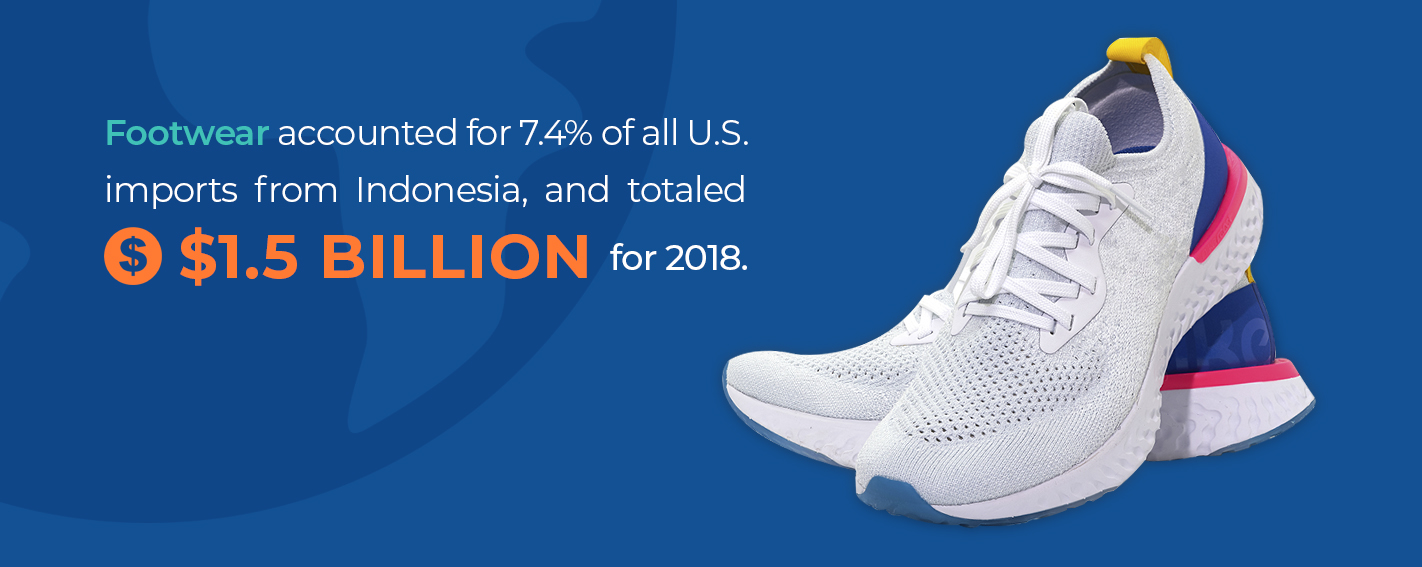 4. Footwear
4. Footwear
Footwear (HS Code 64) accounted for 7.4% of all U.S. imports from Indonesia, and totaled $1.5 billion for 2018. For Q1 2019, footwear imports totaled $436.8 million. Shoes with textile material on the top (HS Code 6404) accounted for 42.9% of footwear imports to the U.S., and shoes with leather on the top (HS Code 6403) accounted for 36.7%.5
Imported footwear from Indonesia is available in a wide range of styles, from classic sneakers to trendy boots. Importing footwear to the U.S. from Indonesia can allow businesses to stock their shelves with affordable and high-quality shoes and boots.
5. Mineral Fuels, Oils and Waxes
Mineral fuels, oils and waxes (HS Code 27) were Indonesia’s largest export worldwide in 2017, accounting for 21.2% of their total global goods exports with a total value of $38.4 billion. U.S. imports of mineral fuels from Indonesia totaled $1.2 billion in 2018 and $33.7 million in Q1 2019. The top imported good to the U.S. in this category was crude oil (HS Code 2709), accounting for 85.1% of imports of mineral fuels from Indonesia.6
6. Electric Machinery and Equipment
U.S. imports of electric machinery and equipment (HS Code 85) from Indonesia totaled $1.2 billion last year. A wide variety of electronic goods were imported from Indonesia in 2018, with fairly even distribution. The top product in this category was insulated wires and cables (HS Code 8544), accounting for 10.1% of U.S. imports. Other top electric goods imported to the U.S. from Indonesia were radio reception apparatuses (HS Code 8527), television receivers and video monitors (HS Code 8528) and electric clippers and razors (HS Code 8510).7
7. Fish and Crustaceans
In 2018, Indonesia exported $1.2 billion in fish, crustaceans and other aquatic invertebrates (HS Code 03) to the U.S. These exports include seafood that is fresh, frozen, chilled, live, dried, salted or in brine. Crustaceans in this category can be in or out of the shell, cooked, smoked, fresh, frozen, etc.
Of the fish and crustaceans exported to the U.S. from Indonesia in 2018, 74.5% were crustaceans (HS Code 0306), 20.8% were fish fillets and fish meat (HS Code 0304) and just 2.5% were mollusks and other aquatic invertebrates (HS Code 0307).8 The most common crustacean imported from Indonesia is frozen shrimp.
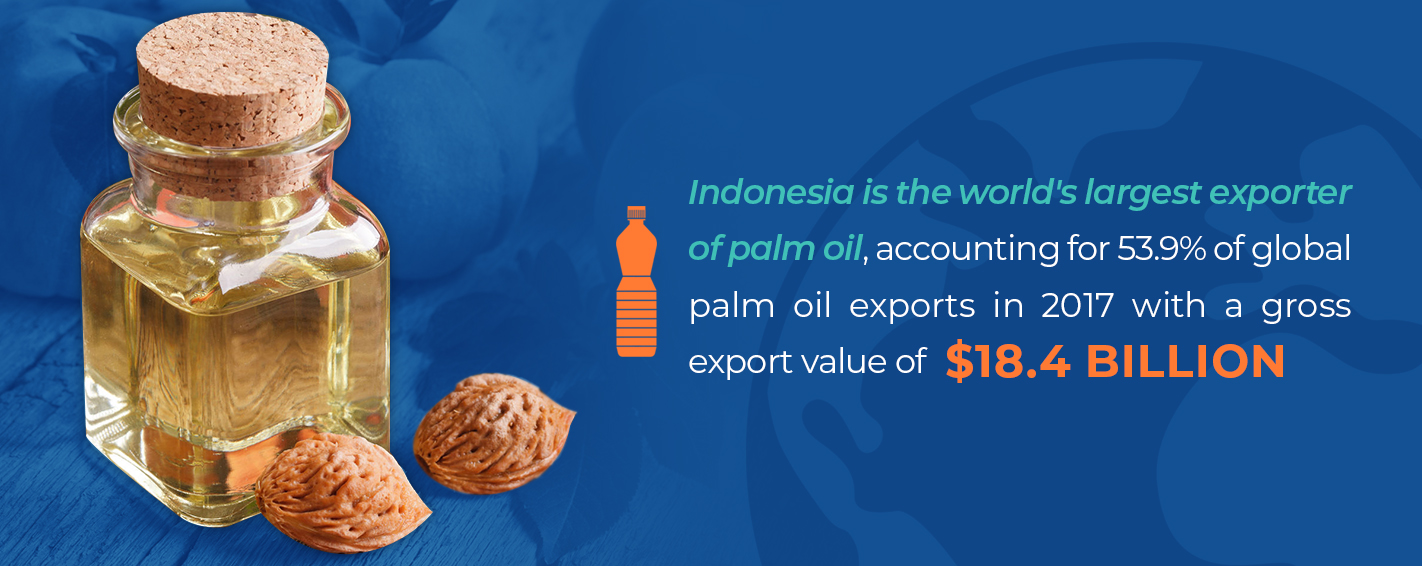 8. Animal and Vegetable Fats, Oils and Waxes
8. Animal and Vegetable Fats, Oils and Waxes
Indonesia is the world’s largest exporter of palm oil (HS Code 1511), accounting for 53.9% of global palm oil exports in 2017 with a gross export value of $18.4 billion. In 2018, the U.S. imported $629.9 million in palm oil. As the primary U.S. vegetable oil import from Indonesia, palm oil accounted for 56.0% of the total $1.1 billion in imports of animal and vegetable fats, oils and waxes (HS Code 15) from Indonesia to the U.S. Palm kernel oil and coconut oil (HS Code 1513) were the second most popular vegetable oil imports from Indonesia and totaled $438.1 million.9
Palm oil and coconut oil are popular imports for food manufacturers due to their affordability and appealing flavor. Coconut oil is also a valuable ingredient in beauty products, cosmetics and other health products.
9. Furniture
Furniture (HS Code 94) accounted for 3.9% of all U.S. imports from Indonesia in 2018, with a total value of $815.5 million. General furniture (HS Code 9403) was the main import at 63.7%, followed by seats (HS Code 9401), at 31.0% of all Indonesian furniture imports.10 Indonesian furniture often features exotic woods, such as teak, bamboo, suar wood, rattan and mahogany, and features excellent craftsmanship and creative designs.
10. Prepared Fish and Crustaceans
In addition to the $1.2 billion in fish and crustaceans imported from Indonesia, the U.S. also imported $704.5 million in prepared or preserved fish and crustaceans (HS Code 16). That includes any product that contains more than 20% fish, crustaceans, mollusks or other aquatic invertebrates by weight. Of these products, 92.5% were prepared or preserved crustaceans (HS Code 1605), such as canned crabmeat or food products containing shrimp.11
Things to Consider When Exporting From Indonesia to the U.S.
Indonesia is a member of the Association of Southeast Asian Nations (ASEAN), and trade relations between the U.S. and ASEAN remain strong. Collectively, ASEAN nations are the fourth-largest trading partner to the U.S. Indonesia and the U.S. also meet yearly under the Trade and Investment Framework Arrangement to continue to build healthy relations.
Importing products from Indonesia to the U.S. is often fairly simple, as the U.S. does not have any trade restrictions specific to goods from Indonesia. However, importers may still be subject to other regulations based on the product they are importing. Imports of edible products, like seafood or tropical oils, and products composed or wood or other organic material may be subject to restrictions from the United States Department of Agriculture (USDA).
USDA import regulations may require businesses to acquire permits or licenses before importing plant or plant products and animal or animal products from Indonesia. If a product, such as a piece of exotic furniture, has materials such as an endangered wood or other endangered plant species, it may also be subject to restrictions under the USDA’s Convention on International Trade in Endangered Species of Wild Fauna and Flora.
U.S. businesses hoping to export products to Indonesia face even steeper challenges than U.S. importers. Recently enacted rules and new permit requirements make it more complicated for Indonesian companies to trade with exporters in the U.S. The regulations on goods imported into Indonesia also place burdens on U.S. exporters, who face increasingly strict labeling requirements and inspections. Here are a few of the regulations for U.S.-to-Indonesia shipping exporters must comply with.
- Ministry of Industry Regulation 24/2013: Revised by MOI Regulation 55/2013, this regulation requires that imported toys be tested in-country on a per-shipment basis. U.S. exporters of toys to Indonesia face hefty documentation requirements, precise technical requirements and significant delays in testing and registration.
- Law 33/2014: Also known as halal law, this Indonesian law requires all food, beverage, pharmaceutical, cosmetic and chemical products to have halal certification. To obtain halal certification, all business processes must comply with halal law.
- Ministry of Agriculture Regulation 34/2016: MOA Regulation 34/2016 requires all poultry and meat exporters to comply with halal law during production. The MOA must inspect and approve facilities before exporting goods to Indonesia.
- Law 18/2009: Amended by Law 41/2014, this regulation requires all exporters of animal-derived products to complete an MOA pre-registration process. Only facilities that have attained individual MOA approval can export to Indonesia.
On top of these and other regulations, U.S. businesses also face uncertain tariffs on goods exported to Indonesia. Indonesia has high bound tariff rates on many goods — for example, the bound tariff rate on fresh potatoes is 50% — and Indonesian applied tariff rates can change unexpectedly.
U.S. business hoping to trade with Indonesia for imports or exports must ensure they have all proper documentation and licensing, and that they stay compliant with both U.S. laws and local Indonesian regulations. If a business fails to meet regulations for trade with Indonesia, their product may get stuck at the port or their business may face more even more costly consequences.
Although a business may be able to navigate these complex trading requirements on their own, Indonesia-to-U.S. shipping is much simpler and safer with a trusted freight partner. Because freight forwarders stay on top of current trade rules and regulations, your shipment and your business will always remain in compliance.
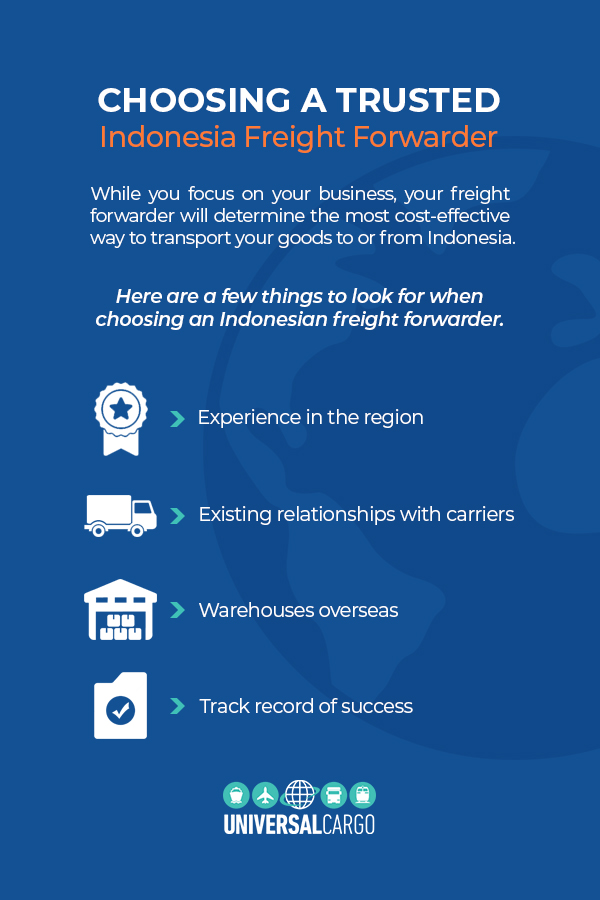 Choosing a Trusted Indonesia Freight Forwarder
Choosing a Trusted Indonesia Freight Forwarder
Working with a freight forwarder streamlines the logistics of Indonesia-to-U.S. importing and U.S.-to-Indonesia exporting to ship your products more quickly and efficiently. Instead of spending countless hours coordinating with carriers and foreign warehouses on your own, choose a trusted freight partner, like Universal Cargo, to manage your U.S.-to-Indonesia shipping for you.
While you focus on your business, your freight forwarder will determine the most cost-effective way to transport your goods to or from Indonesia. A trusted Indonesian freight forwarder may even be able to reduce your shipping costs to increase your business profits.
Here are a few things to look for when choosing an Indonesian freight forwarder.
- Experience in the region: A freight forwarder with knowledge of Indonesian ports, customs and regulations will ship your products safely and efficiently.
- Existing relationships with carriers: Established relationships with international carriers allow a freight forwarder to help you determine the most reliable and cost-effective way to ship your goods from the U.S. to Indonesia or vice versa.
- Warehouses overseas: In tropical regions, products can go bad or get damaged in improperly maintained foreign warehouses. By choosing a freight forwarder that provides overseas warehousing, you can trust your products will remain safe throughout the shipping process.
- Track record of success: A trustworthy Indonesian freight forwarder will have a proven record of success and high-quality service. Choose a freight partner with excellent customer service and positive testimonials from previous customers.
When you find a trusted freight forwarder to manage your shipping to or from Indonesia, you can have peace of mind the company of your choice will transport your goods with both expediency and care.
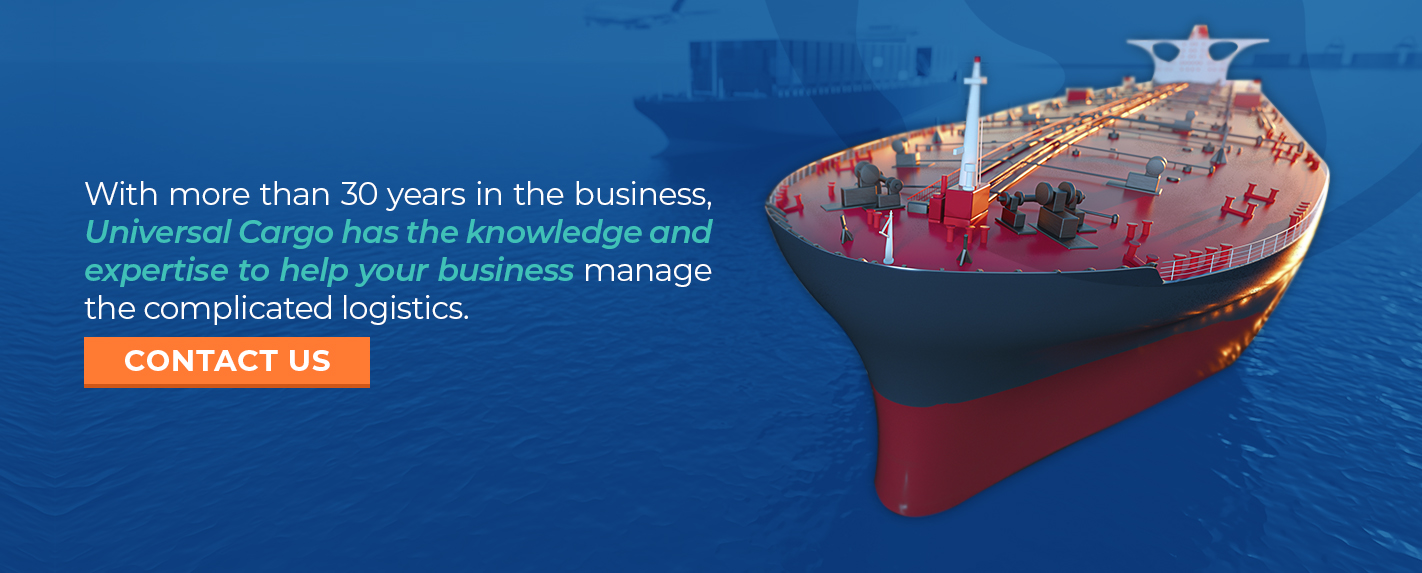 Universal Cargo Shipping Indonesia to U.S. or U.S. to Indonesia for Businesses
Universal Cargo Shipping Indonesia to U.S. or U.S. to Indonesia for Businesses
Universal Cargo is a full-service freight forwarder with experience shipping goods and products to and from Indonesia. With more than 30 years in the business, Universal Cargo has the knowledge and expertise to help your business manage the complicated logistics of U.S.-to-Indonesia shipping or Indonesia-to-United States shipping. We even have representation in all major ports worldwide and existing relationships with international carriers.
Whether your business wants to import Indonesian clothing products or export industrial machinery, our team can help determine the fastest and most affordable shipping method. Universal Cargo offers various freight forwarding services, including ocean freight, air freight and express air freight, as well as warehousing services for products we ship.
When you choose Universal Cargo for your freight partner, you’ll enjoy complimentary cargo tracking and exceptional service from our dedicated staff. We also offer cargo insurance for even more peace of mind. Contact Universal Cargo for a free quote on Indonesia-to-U.S. shipping for your business.
- https://prnt.sc/nx7z6m
- https://prnt.sc/nxabp2
- https://prnt.sc/nxa92u
- https://prnt.sc/nx8mhb
- https://prnt.sc/nx9kkq
- https://prnt.sc/nx9r10
- https://prnt.sc/nx9p43
- https://prnt.sc/nx9ue9
- https://prnt.sc/nx9yuw
- https://prnt.sc/nxa1nc
- https://prnt.sc/nxa18u



